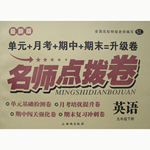题目内容
— I bring you your coffee now or you rather have it with your lunch?
—I’d like it now,sweetheart.
A.Shall,would B.Will,should C.Should,would D.Shall,will
A

 名师点拨卷系列答案
名师点拨卷系列答案Dear Betty,
My roommate’s family wants me to celebrate Thanksgiving Day with them in their home. I accepted the invitation, and I’m excited about going, but I’m a little nervous about it, too. The social customs in my country are different from those here, so I’m a little worried about making mistakes.
Should I bring a gift, such as candy or flowers? Should I arrive on time or a little late? At the dinner table, how can I know which fork or knife to use? How can I let the family know that I’m thankful for their kindness?
Yours,
Knowing Nothing
Dear Knowing Nothing,
It’s a good idea to bring a gift when you go to a dinner party. Flowers are always welcome, or you can bring a bottle of wine if you know the family drink it.
You should arrive on time or five to ten minutes late. Don’t get there early. If you are going to be more than fifteen minutes late, you should call and tell them.
Try to relax at the dinner table. If you don’t know how to use the right fork, knife or spoon, just watch the other guests, and follow them. If you still have no idea of what to do, don’t be shy about asking the person next to you; it’s better to ask them than to be silently uncomfortable and nervous.
If you like the food, say so. Of course, you’ll thank the host and hostess for the meal and for their kindness. It’s also a good idea to send a card to thank them the day after.
Yours,
Betty
1. Knowing Nothing wrote a letter to Betty to _____.
|
A.tell Betty some good news |
B.ask for some advice |
|
C.answer some questions |
D.invite her to dinner |
2.According to Betty, Knowing Nothing ______ when going to a dinner party.
|
A.can only bring some flowers |
|
B.can’t bring wine |
|
C.should arrive on time or five to ten minutes late |
|
D.should arrive twenty minutes late |
3. Betty does NOT advise Knowing Nothing to _____.
|
A.relax at the dinner table |
B.watch the other guests |
|
C.ask the person beside him |
D.keep silent at table |